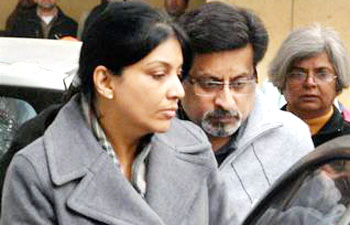 New Delhi, Apr 24: A CBI officer on Tuesday placed on record his view of the motive for the Aarushi-Hemraj double murder and the manner in which the crime was committed. On the fourth day of his cross-examination, CBI's investigating officer AGL Kaul told the Ghaziabad court that Aarushi's father Dr Rajesh Talwar killed her and Hemraj after finding them in an "objectionable position on Aarushi's bed". Kaul's statement supports Noida police's theory of May 23, 2008.
New Delhi, Apr 24: A CBI officer on Tuesday placed on record his view of the motive for the Aarushi-Hemraj double murder and the manner in which the crime was committed. On the fourth day of his cross-examination, CBI's investigating officer AGL Kaul told the Ghaziabad court that Aarushi's father Dr Rajesh Talwar killed her and Hemraj after finding them in an "objectionable position on Aarushi's bed". Kaul's statement supports Noida police's theory of May 23, 2008.
The two were killed on the intervening night of May 15-16, 2008.
Kaul also recreated the sequence of events relying on circumstantial evidence. However, defence counsel Satyaketu Singh told TOI: "It is all Kaul's imagination. His theory negates the circumstantial evidence he has talked about so far. If Hemraj was attacked in Aarushi's room, how come there was no trace of his blood in that room?" He also said Kaul was unable to explain the mix-up of pillows taken from the rooms of Hemraj and another domestic help, Krishna.
CBI had initially cited a CDFD-Hyderabad report to claim that Krishna's pillow had Hemraj's DNA on it. Later, it verbally informed the Allahabad high court that the submission was based on a typographical error. "For this, CBI also got a fabricated reply from CDFD and they never put anything on record. Kaul personally managed the whole frame-up," Singh alleged.
Kaul told court on Tuesday that both the accused (doctors Rajesh and Nupur Talwar) and the victims (Aarushi and Hemraj) were present in the house.
There was no forced entry or theft, and the accused could not give a clear account of what happened that night, he added.
The postmortem report says death occurred between midnight and 1am on May 16, 2008. Kaul claimed that Dr Rajesh Talwar, who was awake in his room, heard a sound around midnight and came to Hemraj's room through the lobby to investigate. He didn't find the help there but picked up one of the two golf sticks kept there. He next came to Aarushi's room which was shut but not locked.
"He opened the door and saw Aarushi and Hemraj in an objectionable state on her bed," Kaul said, adding, Dr Talwar then attacked Hemraj on the head with the golf stick.
The second blow, he claimed, fell on Aarushi's forehead. By the time Dr Nupur came to the room, Hemraj had fallen off the bed. The Talwar couple checked Aarushi's pulse and found her dead. They got scared and made a plan to kill Hemraj and hide his body, Kaul told court.
He claimed Hemraj was wrapped in a sheet and dragged to the terrace where his throat was slit. The Talwars placed a cooler panel on the body, and locked the stairs from inside, before rearranging things in Aarushi's room and slitting her throat to make the murders seem like the handiwork of one person.
"Nupur cleaned Aarushi's private parts and changed her clothes. After that they cleaned the bloodstains and collected the bloodstained clothes to dispose of in the morning along with the weapon."





Comments
Add new comment